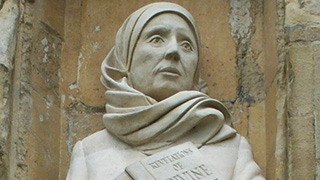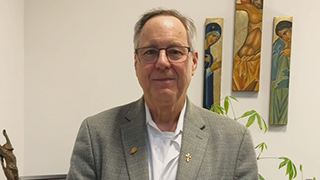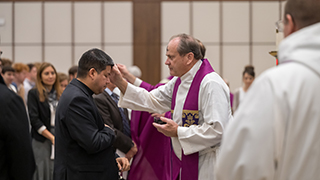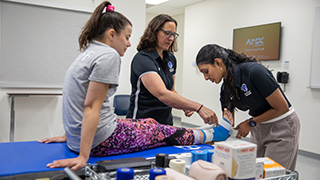Inside the Core: Erin Risch Zoutendam Receives The Manfred Lautenschlaeger Award
Friday, December 8, 2023

Erin Zoutendam, Ph.D., award recipient.
Inside the Core we are very excited that Core Fellow Erin Risch Zoutendam,Ph.D, has received The Manfred Lautenschlaeger Award for Theological Promise 2024, which is given to ten international young (under thirty-five year old) scholars. The celebration of the awards’ recipients will take place at the University of Heidelberg in May 2024. The winners will receive a prize of € 3,000 each and the opportunity to attend the colloquium in Heidelberg, where they will have the opportunity to present their research and interact with the other Lautenschlaeger international scholars. It is a great honor for one of our Core Fellows to receive this recognition, especially in her first semester here at Seton Hall.
The recognition was based upon Erin’s scholarly research in her doctoral dissertation, which she wrote at Duke University, where she received her Ph.D. in 2023. She says regarding the award: "It's an honor to have my dissertation recognized in this way, especially because so much time, attention, and love goes into a project of that size. So much of my research is concerned with how the Christian tradition changes over time, with an eye to how those changes continue to affect us today—so I draw from that research all the time as a teacher in the Core."
In fact, the topic of her research is deeply linked to the kind of study at the very heart of the Core. The following description from Erin of her scholarly research for her doctorate gives the specifics:
At its heart, this is a historical study of how Christians have prayed and of how they have read scripture and of how the two practices have always been intertwined. Specifically, it examines hermeneutical changes that occurred between the later Middle Ages and the earliest decades of the Protestant Reformation and asks how these changes affected beliefs about mystical contemplation, Christian spirituality, and union with God.

Medieval mystic Julian of Norwich.
In the later Middle Ages, Christians sought the presence of God through mystical contemplation, which offered a foretaste of the beatitude that the saints in heaven were believed to enjoy eternally. The scriptures played an important role in late medieval Christians’ pursuit of this mystical union: not only did reading or meditating on the scriptures prepare the soul for mystical ascent, but the scriptures were believed to contain several accounts of biblical figures who enjoyed ecstatic and contemplative union. Early Protestant reformers, however, made precisely the opposite claim. For magisterial Protestants, mystical contemplation as it was practiced in the later Middle Ages was profoundly unbiblical. According to these writers, the only way to find late medieval mystical ideals in the pages of scripture was to twist and distort the words of scripture beyond their plain meaning.
This dissertation examines how developments in biblical hermeneutics during the later Middle Ages and the Reformation contributed to Protestant reformers’ rejection of mystical theology. It asks how and why late medieval and early modern Protestant writers came to different – and often contradictory – conclusions about what the Christian scriptures had to say about mystical contemplation, and it examines how the criteria for what was considered "scriptural" underwent dramatic changes during the Reformation.
The lived tradition of the Christian faith over time is central to what we study in the Core, in conversation with other traditions and perspectives. In fact, the medieval mystics Julian of Norwich and Hildegard of Bingen are authors we study in Core II. Erin‘s research, as she has mentioned, is exactly the kind of scholarship that can and does inform courses like Journey of Transformation (Core I) and Christianity and Culture in Dialogue (Core II).
We in the Core are thrilled that one of the newest additions to our roster of Core Fellows has received this recognition and even more grateful that she shares her now internationally recognized scholarship with her students in Core I and Core II.
Categories: Faith and Service






